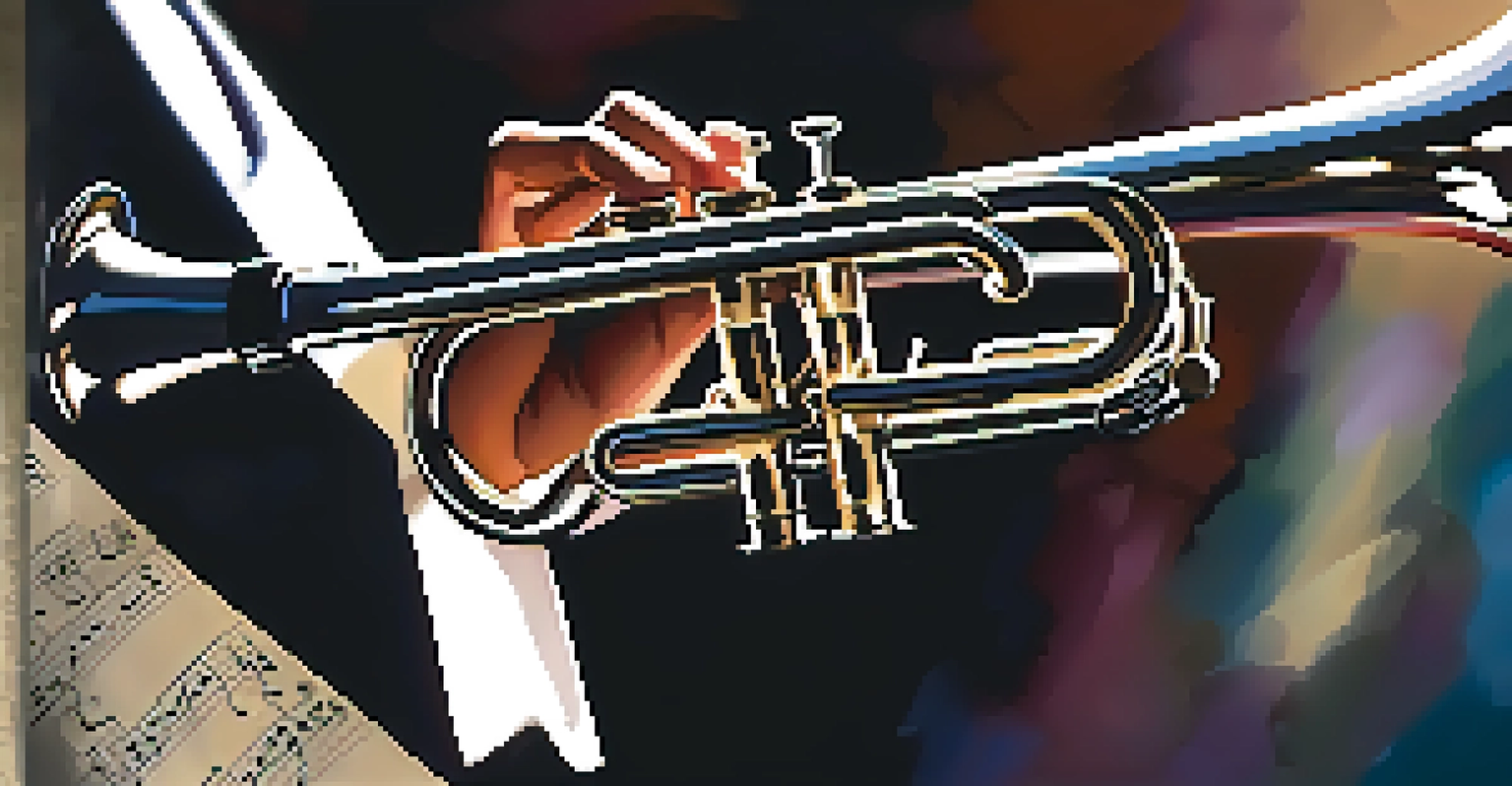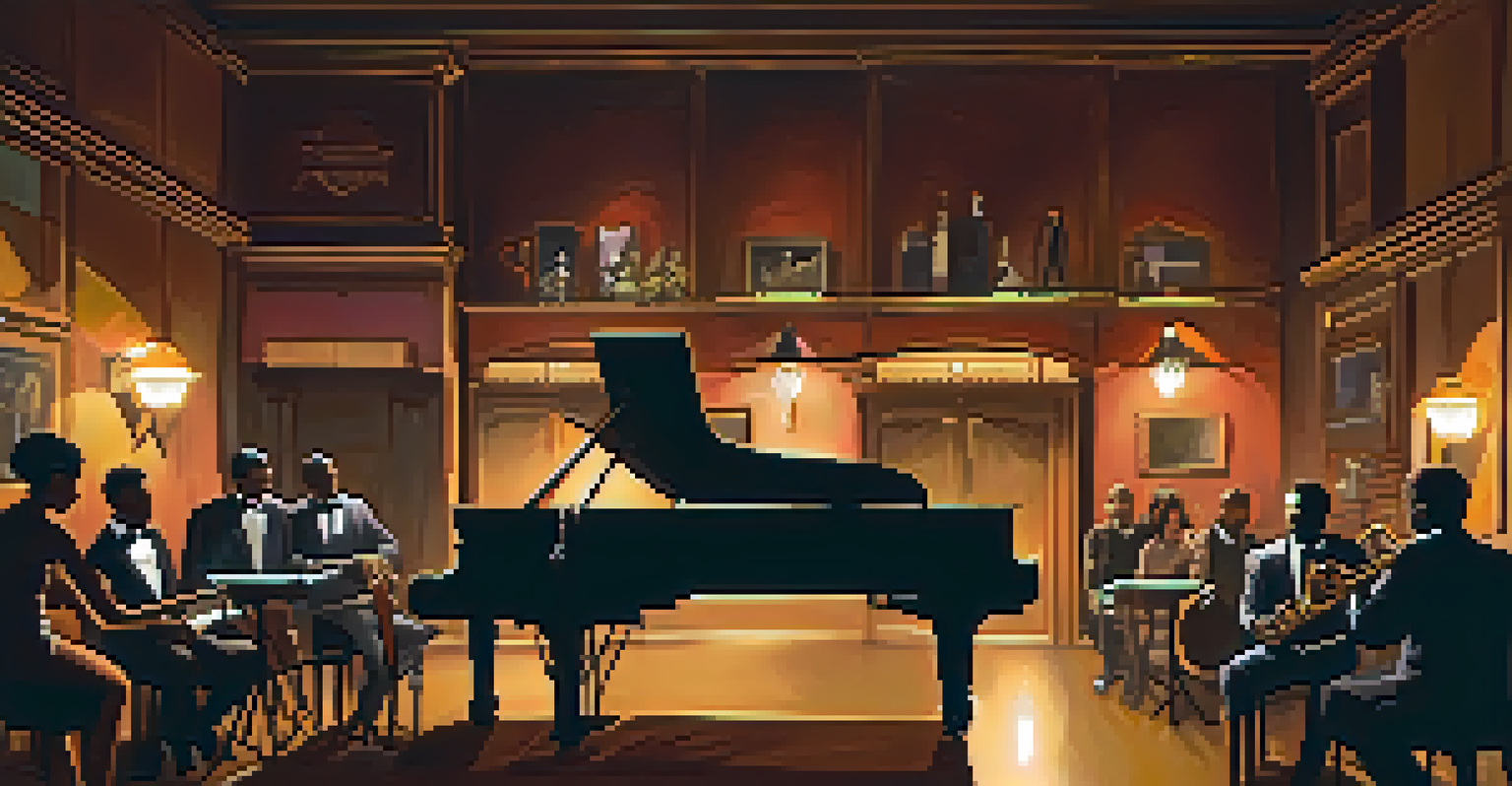Jazz Musicians from Louisiana Who Shaped American Music

Louisiana: The Birthplace of Jazz
Louisiana, particularly New Orleans, is often regarded as the birthplace of jazz. This vibrant city, with its rich cultural tapestry, provided the perfect backdrop for jazz to flourish in the early 20th century. The melding of African, Caribbean, and European musical influences created a unique sound that resonated with many.
Jazz is a music that has a lot of different colors, and it's all about the emotional expression of the artist.
New Orleans' lively atmosphere, with its street parades and lively clubs, served as a breeding ground for jazz musicians. It was here that improvisation became a hallmark of the genre, allowing musicians to express themselves freely. This spirit of creativity and collaboration set the stage for jazz to evolve and spread across America.
As jazz began to take shape, the musicians from Louisiana infused their personal experiences and cultural heritage into their music. This not only enriched the genre but also laid the groundwork for future generations of musicians, making Louisiana a cornerstone in the history of American music.
Louis Armstrong: The Trumpet Virtuoso
No discussion of jazz would be complete without mentioning Louis Armstrong, one of the most iconic figures in music history. Born in New Orleans in 1901, Armstrong's unique trumpet style and gravelly voice brought jazz into the mainstream. He was a master of improvisation, often transforming songs into personal expressions that captivated audiences worldwide.

Armstrong's influence extended beyond his musical talent; he was also a cultural ambassador for jazz. Through his tours and recordings, he introduced jazz to international audiences, helping to cement its status as a global genre. His charisma and stage presence made him a beloved figure, not just as a musician but as a symbol of American culture.
Jazz Originated in Louisiana
Louisiana, especially New Orleans, served as the cultural melting pot where diverse musical influences combined to create jazz in the early 20th century.
His legacy endures in the way jazz is played and appreciated today. Armstrong's ability to connect with listeners through his music continues to inspire countless musicians, making him a true pioneer who shaped the very essence of jazz.
Dizzy Gillespie: The Innovator of Bebop
Dizzy Gillespie, born in Cheraw, South Carolina, but heavily influenced by his time spent in Louisiana, is celebrated for his role in developing bebop, a complex and fast-paced style of jazz. Known for his virtuosic trumpet playing and unique style, Gillespie pushed the boundaries of jazz in the 1940s. His innovative approach incorporated intricate melodies and harmonies, which transformed jazz into a sophisticated art form.
If you don't live it, it won't come out of your horn.
Beyond his musical genius, Gillespie was a dynamic performer who engaged with his audience through humor and flamboyant stage antics. His signature bent trumpet and puffed cheeks became iconic symbols of his larger-than-life persona. This engaging presence drew people into the world of jazz, making it accessible and exciting.
Gillespie's contributions to jazz extended to education, as he mentored many young musicians. His commitment to innovation and teaching ensured that the spirit of jazz would continue to evolve, influencing generations to come.
Professor Longhair: The Rhythm Pioneer
Professor Longhair, born Henry Roebuck in 1918, is often hailed as the architect of New Orleans rhythm and blues. His unique piano style, which blended traditional jazz, blues, and Caribbean influences, helped shape the sound of New Orleans music. Longhair's ability to fuse different genres made him a key figure in the evolution of jazz and popular music.
His songs, such as 'Bald Head' and 'Tipitina,' became classics that showcased his distinctive rhythm and playful melodies. Longhair's performances were imbued with a sense of joy and spontaneity, inviting audiences to dance and celebrate. This infectious energy played a crucial role in bringing jazz into the mainstream.
Louis Armstrong's Global Impact
Louis Armstrong not only revolutionized jazz with his unique style but also popularized the genre internationally, becoming an iconic figure in American music.
Despite facing challenges throughout his career, including periods of obscurity, Professor Longhair's influence remains undeniable. His pioneering spirit paved the way for future musicians, ensuring that the sounds of New Orleans would resonate far beyond its borders.
Jelly Roll Morton: The First Jazz Composer
Jelly Roll Morton, born Ferdinand Joseph Lamothe in 1890, is often credited as one of the first composers of jazz music. His innovative approach to blending ragtime and blues laid the groundwork for jazz as an organized musical form. Morton’s compositions, such as 'King Porter Stomp,' showcased his ability to mix intricate arrangements with lively rhythms.
Morton's confidence as a performer was matched only by his ambition to elevate jazz to a respected art form. He was among the first to write down jazz music, creating a bridge between improvisation and composition. This duality allowed jazz to be recognized as a serious genre, opening doors for future composers and musicians.
Though he faced racial discrimination and challenges during his career, Morton's contributions to jazz remain significant. His legacy lives on in the works of countless musicians who draw inspiration from his pioneering spirit.
Clarinet and Jazz: The Influence of Sidney Bechet
Sidney Bechet was one of the first important soloists in jazz history, known for his virtuosic clarinet and soprano saxophone playing. Born in New Orleans in 1897, Bechet's passionate performances and innovative improvisation set him apart from his contemporaries. His ability to convey deep emotion through his music resonated with audiences, making him a beloved figure in the jazz world.
Bechet was also instrumental in popularizing jazz in Europe, particularly in France, where he settled for many years. His presence abroad helped to establish jazz as an international genre, drawing attention to the talents of American musicians. This cultural exchange enriched the music scene in both continents, creating a lasting legacy.
Legacy of Louisiana Jazz Musicians
The contributions of Louisiana musicians have fundamentally shaped jazz and continue to inspire artists across various musical genres worldwide.
Today, Bechet's influence can be felt in various styles of music, from jazz to classical. His commitment to expression and innovation has inspired countless musicians, ensuring that his spirit continues to thrive within the jazz community.
The Legacy of Louisiana Jazz Musicians
The musicians from Louisiana have played an essential role in shaping not just jazz, but the entire landscape of American music. Their contributions have laid a foundation that continues to inspire and influence artists across genres. From the vibrant sounds of New Orleans to the improvisational spirit of jazz, these musicians have left an indelible mark on history.
As we reflect on the legacy of these legendary figures, it's clear that their music transcends time and culture. They created a genre that celebrates individuality and collective expression, inviting listeners to connect with their emotions and experiences. This universal appeal is a testament to the power of jazz as an art form.

By honoring the contributions of these Louisiana musicians, we keep their spirit alive and ensure that future generations will continue to explore and innovate within the world of jazz. Their stories and sounds remind us of the rich cultural heritage that has shaped not only American music but the global music scene.